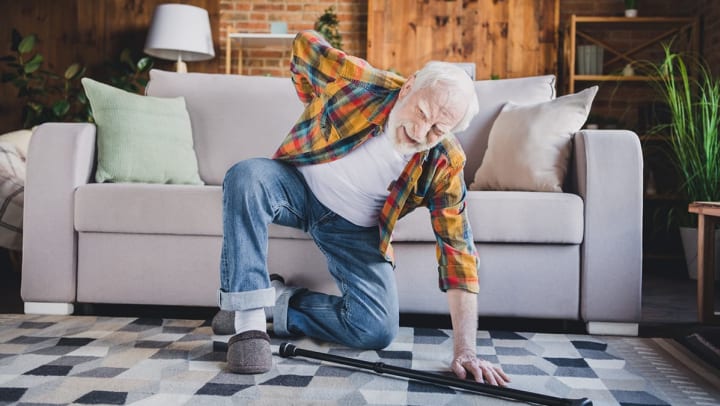
We often hear from family caregivers who are overcome with guilt and worry when a loved one with Alzheimer’s falls and breaks a hip or fractures a knee. “Why did I let him go and get the mail?” “Why did he get up when I asked him not to?”
If you’ve experienced the fall of a loved one, instead of blaming yourself (or them), it’s time to put the blame where it belongs, on the real culprit: your loved one’s brain.
Dementia manifests itself in a multitude of cognitive and physical issues that work against an individual attempting to do simple things he or she did all their lives. That includes walking.
What’s happening?
Dementia causes damage to the motor and premotor cortex, the limbic system, and the basal ganglia of the brain. All of these areas must work together collectively to coordinate signals from the brain to the muscles to carry out the complex network of movement involved in doing things like standing up, sitting down, turning around and walking.
When dementia impairs these processes, the result is often a fall.
And when a fall does occur, an individual with dementia is six times more likely to suffer a broken bone than a healthy aging adult. In late-stage dementia, a spiral fracture is more likely, which can result in a broken hip. Unfortunately, that will lead to a hospital stay, quite possibly an end-of-life event.
One thing that you may not realize is that falls can differ depending on the type of dementia an individual has.
Different types of dementia can impact movement and strength differently.
The nature and direction of the fall may differ depending on the type of dementia. Here are a few examples from the National Institute on Aging and the Itty Bitty Dementia Book by Tam Cummings:
The more you know the better prepared you can be.
Of course, it’s impossible to be at your loved one’s side 24/7 and important to remember that falls will most likely happen at some point. But here are some tips from our Anthem Memory Care communities to help safeguard your loved one from taking a bad fall:
When the potential for falls increases, it’s time to consider memory care.
Memory care communities tailor their programs and care regimens to meet the unique challenges of individuals with dementia. Memory care professionals are well aware of the link between memory loss and mobility issues that can heighten the risk of a fall. That is why their buildings include mobility aids as well as visual cues to help mitigate arising issues that could precede a fall. Built-in features may include handrails, color coded pathways, signage, and flooring with non-glare coating.
The memory care staff is highly trained to provide specialized care to individuals with dementia in the form of assistance with activities of daily living and mobility support. While there is never a guarantee that a fall will not happen, working with residents on a daily basis to optimize their physical strength and balance can help reduce the likelihood of a fall or lessen the severity of an injury resulting from a fall.
Feel free to contact an Anthem Memory Care community near you. We’ll be glad to answer your questions and schedule a tour. We’re here to help!